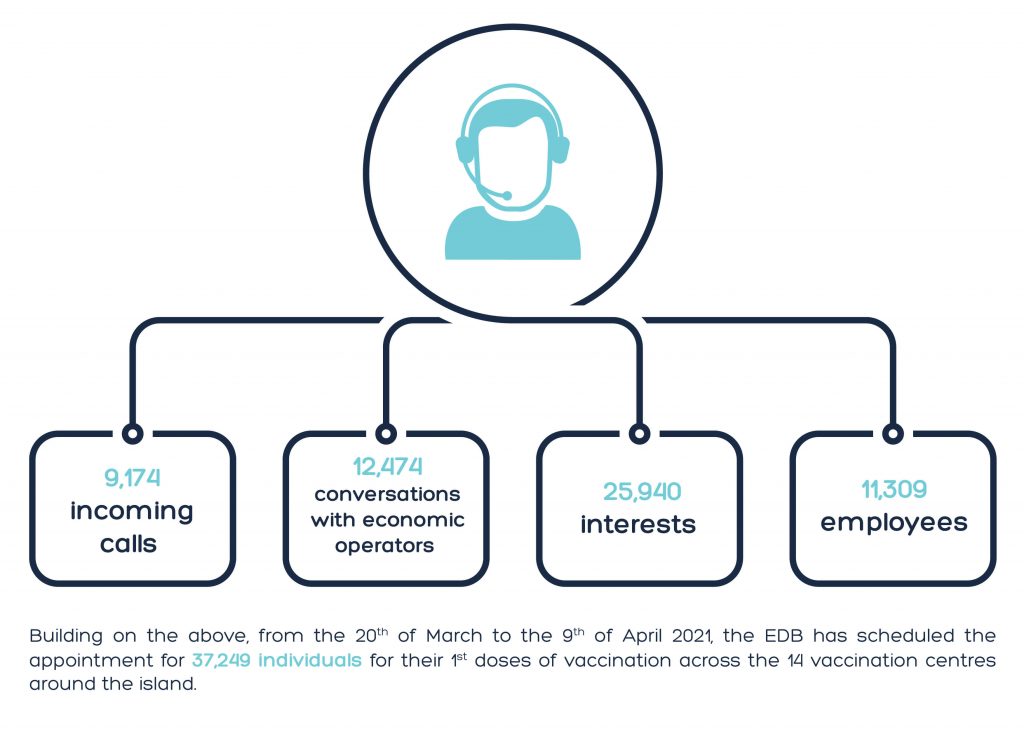The EDB Information Centre Team
Covid-19 Vaccination Programme
During the recent lockdown period in March 2021, the EDB team has once again displayed true dedication and hard work.
Following the initiative of Government of Mauritius to put into effect the “Covid-19 Vaccination Programme”, the EDB has provided its assistance to launch a “vaccination programme for business operators” and has put in place a dedicated electronic platform to allow business operators in specific categories to register for the Covid-19 vaccination.
To successfully implement this vaccination programme, the support of EDB staff was greatly needed and the staff responded very positively to the call. The time, amount of effort and energy, and enthusiasm that the EDB team put into was tremendous and demonstrated a great teamwork and team spirit. The EDB Team contacted more than 12,450 persons for the vaccination programme over four weeks.
A special thanks to the Information Centre Team, EDB Staff and all Attendants/Drivers who have shown commendable commitment, above and beyond the call of duty, during this difficult time and the hard work was greatly appreciated.

“Alone we can do so little; together we can do so much.” – Helen Keller

EDB attendants and drivers.
Health Tips
The present pandemic situation has changed our lifestyle as fitness centres and other locations where we are normally active, are temporarily closed. Staying at home for prolonged periods of time can pose a significant challenge to remain fit.
It is recommended: 150 minutes of moderate-intensity or 75 minutes of vigorous-intensity physical activity per week, or a combination of both. These recommendations can still be achieved even at home, with no special equipment and with limited space.
Additional useful heath tips are provided below:
1. Don’t drink sugar calories
Sugary drinks are among the most fattening items you can put into your body.
This is because your brain doesn’t measure calories from liquid sugar the same way it does for solid
2. Avoid processed junk food (eat real food instead)
Processed junk food is incredibly unhealthy.
These foods have been engineered to trigger your pleasure centers, so they trick your brain into overeating.
3. Don’t fear coffee
Coffee is very healthy.
It’s high in antioxidants, and studies have linked coffee intake to longevity and a reduced risk of type 2 diabetes, Parkinson’s and Alzheimer’s diseases, and numerous other illnesses.
4. Eat fatty fish
- Fish is a great source of high-quality protein and healthy fat.
- This is particularly true of fatty fish, such as salmon, which is loaded with omega-3 fatty acids and various other nutrient.
- Studies show that people who eat the most fish have a lower risk of several conditions, including heart disease, dementia, and depression
5. Get enough sleep
The importance of getting enough quality sleep cannot be overstated.
Poor sleep can drive insulin resistance, disrupt your appetite hormones, and reduce your physical and mental performance.
What’s more, poor sleep is one of the strongest individual risk factors for weight gain and obesity. One study linked insufficient sleep to an 89% and 55% increased risk of obesity in children and adults, respectively.
6. Take care of your gut health with probiotics and fiber
The bacteria in your gut, collectively called the gut microbiota, are incredibly important for overall health.
A disruption in gut bacteria is linked to some of the world’s most serious chronic diseases, including obesity.
Good ways to improve gut health include eating probiotic foods like yogurt and sauerkraut, taking probiotic supplements, and eating plenty of fiber. Notably, fiber functions as fuel for your gut bacteria.
7. Drink some water, especially before meals
Drinking enough water can have numerous benefits.
Surprisingly, it can boost the number of calories you burn
8. Don’t overcook or burn your meat
Meat can be a nutritious and healthy part of your diet. It’s very high in protein and contains various important nutrients.
9. Avoid bright lights before sleep
When you’re exposed to bright lights in the evening, it may disrupt your production of the sleep hormone melatonin
10. Eat vegetables and fruits
Vegetables and fruits are loaded with prebiotic fiber, vitamins, minerals, and many antioxidants, some of which have potent biological effects.